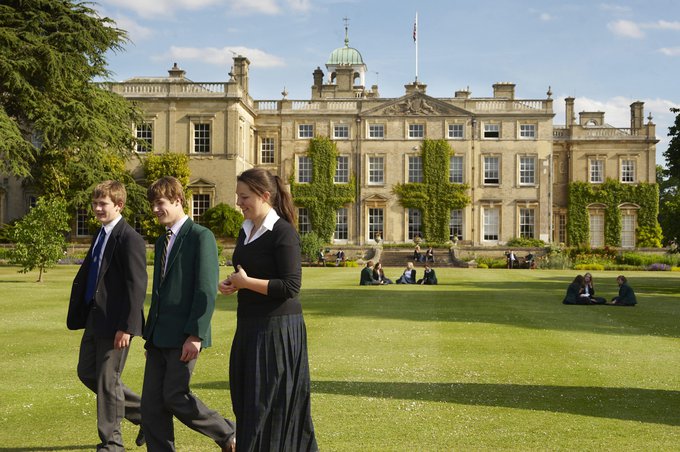
Boarding school in England
A boarding school in England is a closed educational institution with a separate campus, where children both study and live (at their place of residence) throughout the school year. British boarding schools can be weekly or partial (children go home on weekends) or full (students only go home on vacation). Full board is the most common form of education in private schools in the UK, with over 500 boarding schools in the United Kingdom (England, Scotland, Northern Ireland and Wales). Such schools bring together both British citizens and foreigners within their walls. Sometimes you can find a scheme of joint learning, when programs are simultaneously taught to both boarders and full-time students who come to students: this only improves the atmosphere inside the educational institution, makes the composition of students more balanced and diverse. There are boarding schools for blended learning, as well as separate male and female boarding schools: for example, one of the most famous schools in the world - Eaton - is dedicated only to teaching young men. Both separate education (a historical tradition in the UK) and blended education have their supporters - we will help you choose the most suitable option, explaining the features and benefits of both types of education. Boarding schools are divided into private (independent) and public, there are some fundamental differences between them:
Prevalence and popularity: There are over 450 private boarding schools in the UK and about 35 public
Accessibility for foreigners: independent boarding schools accept students from all over the world without any restrictions, while UK citizens and members of the European Union can study at a public institution
Cost: private boarding schools will require quite an impressive investment, since the institution develops only at the expense of tuition fees. In state boarding houses, only accommodation is paid, and the educational programs themselves are free (financed from the state treasury).
Due to the relatively high cost, private boarding schools in the UK usually provide more opportunities for recreation, study and extracurricular activities, more modern equipment and better infrastructure. But there are also public schools - boarding schools with a high rating and excellent reviews - we will help you choose the best option for you from all sides.
The structure of education in British boarding schools
Studying at a British boarding house is divided into three stages:
Elementary School - Elementary School, Children's School, Junior School, Prep School and Prep School (the latter names are more commonly used by UK private boarding schools) = 4-5 to 11-13 years old. Middle grades - high school, high school and high school (the latter term is more often used by private boarding schools) = 11 to 13-16 years old
Senior, graduation classes - Sixth grade = 16-18 years old.
Usually, a boarding school is provided for children from 7-11 years old (the specific age must be indicated separately in each school), until this moment children can study in the daytime form. As a rule, the main wave of foreign students enters the English boarding school at the age of 7 years, 11-13 years old, 14-16 years old - this parameter depends on the student's educational goals. Private boarding schools, as a rule, are not limited to standard educational programs: they organize short-term courses, recreation programs throughout the year, summer camps. This is a great opportunity to get to know a priority school, try living on a British campus, prepare for studying abroad for a longer and more complex program.
Features and benefits of boarding schools in England
The best British boarding schools are not just schools: they are entire campuses with their own infrastructure, rules, history and lifestyle. This is a place where students grow up into harmonious, comprehensively developed and educated personalities, become citizens of the world, prepare for building a career and achieving high personal goals. Boarding schools in England pay close attention not only to the academic program: development in the sports and creative, social sphere here is in step with basic education. There are many electives, sections, clubs and communities of interest on the campus, sports are always included in the curriculum of both junior and middle and senior classes, interesting lectures, master classes and other educational and exciting events are held. A British boarding school is a great choice for those who are sending a child to study abroad for the first time. The campus is always carefully guarded around the clock, students are prohibited from leaving it without the permission and support of the teacher and teachers: this creates a safe, comfortable, cozy environment for living, learning and development. Educators and teachers usually live with students in campus dormitories: therefore, they can be responsible for the safety of their wards around the clock, monitor the observance of cleanliness, order and discipline, and also quickly come to the rescue to resolve any issues. Also, teachers monitor compliance with the daily routine: this helps students not to overstrain, keep up with studies and additional activities, and also devotes compulsory time to rest.
UK Private Boarding School Tuition Fees
The price paid by students of private British boarding schools can be different: it depends on the rating and prestige of the institution, its popularity and elite, location and historical significance. You can target the amount from 30 to 47 thousand pounds per academic year: this is tuition and accommodation in full board, free use of the entire campus infrastructure, additional optional classes, circles and sections. There are also more budget options, for example, with costs ranging from £ 17,500 to £ 19,000 per academic year - these are good, high-ranking schools with high graduate performance. For each of our students, we select the best options on an individual basis, listening to all your requirements and wishes and adequately assessing the possibilities.
